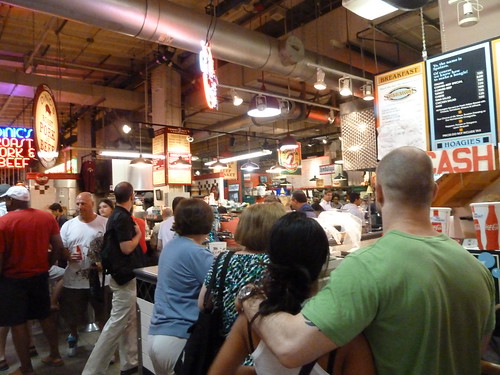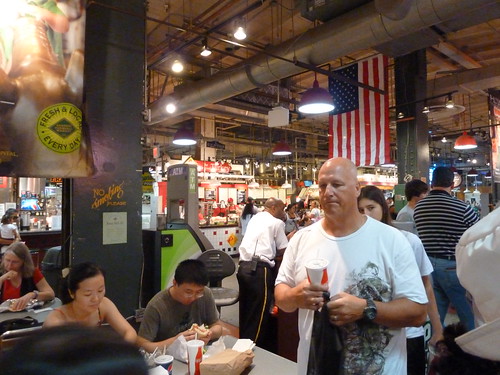Friday, August 05, 2011
Is it just me?
I had good intentions of blogging throughout the AALL Conference in Philadelphia. But that was before I hit a major snag with the Safari browser on my new iPad, along with some connectivity hassles. And then the hectic pace of the meetings and programs just got away from me. The compressed schedule seems to be getting tougher to keep up with. Or is it just me?
Thursday, July 28, 2011
From the TS list . . .
What a great week in Philadelphia!
If you attended any of the great TS-SIS sponsored programs at AALL this past week, please complete our online program evaluation. Your feedback is important for future programming. Click here to get started. Survey closes August 10.
TS-SIS sponsored programs included:
Is-ness vs. About-ness: Development and Implementation of LC Law Genre/Form Terms
The Elusive Updating Loose-Leaf: Cataloging Standards and Practices for the 21st Century
Hot Topic: The RDA Decision and What It Will Mean For Me and My Library!
Analyzing, Managing and Communication About Library Budgets: How Are You Doing it?
Thank you on behalf of the TS-SIS Education Committee and our talented speakers.
Best,
Suzanne Graham
TS-SIS Member-at-Large, 2010-2012
If you attended any of the great TS-SIS sponsored programs at AALL this past week, please complete our online program evaluation. Your feedback is important for future programming. Click here to get started. Survey closes August 10.
TS-SIS sponsored programs included:
Is-ness vs. About-ness: Development and Implementation of LC Law Genre/Form Terms
The Elusive Updating Loose-Leaf: Cataloging Standards and Practices for the 21st Century
Hot Topic: The RDA Decision and What It Will Mean For Me and My Library!
Analyzing, Managing and Communication About Library Budgets: How Are You Doing it?
Thank you on behalf of the TS-SIS Education Committee and our talented speakers.
Best,
Suzanne Graham
TS-SIS Member-at-Large, 2010-2012
De Arte et de Jurisprudentia: Meditationes ad Res
Dr. Jolande Goldberg, inaugural winner of the AALL Distinguished Lectureship, gave an address Monday entitled De Arte et de Jurisprudentia: Meditationes ad Res. The subtitle given in the program, Some Aspects of Legal Iconography, gave more of an idea of what they talk was about. She explored the images in legal books describing first consanguinity relationships in religious law -- i.e. who you are related and who you are not allowed to marry -- and then showed how the same images (often presented as a tree) are used to describe the inheritance relationships in civil law -- i.e. who inherits first, etc. Interestingly, Goldberg claims that it was the issue of inheritance that was the very first bit of civil law that was worked out. It seems that this was thing in life that first needed a legal expression. It was a fascinating talk, and it will be interesting to see it in print, where we can see the images up close. She opened it by discussing how she came to be writing the classification schedules for civil and then religious laws, and how they too use similar "tree" to explain the relationship not of relatives but of parts of the law. She liked this project, she said, finding it good for "testing the wits and pushing the envelope." Anyone who knows Dr. Goldberg knows that that is something she would like very much. Look for the published version in Law Library Journal.
More about Emerging technologies
Going through my notes again on the Emerging technologies and the library manager program I found a few more interesting points. Again, it was great program, I thought, in that it was pretty informal. We were all in the position of wondering what Richard should or could have done. Could he have done something differently to get the support of his director for Digital Commons? Should he have acted differently when he did not get that support? In hindsight yes -- not wasted time on the other product. But could he have known that without trying it? Was it not possible that he might have been able to build something on the other product that would have convinced his director that it was a worthy project, worthy of the $15,000 that Digital Commons would cost?
In any case, Simon had a few tips on middle management.
We've all been in the position of having a great idea, and then having that great idea stymied. It's still not clear what to do about this, but having Richard hold his problem up to the light for us to look at and think about is very helpful, as is the recognition that you (okay, me) are not the only one in this situation.
In any case, Simon had a few tips on middle management.
- If all you're hearing about is the budget, then you can assume that any costly product is a no-go.
- Are other libraries doing it? This might be important information.
- Capitalize on strengths. Do you have a staff member who's being wasted in the spot they're in? Give people challenging projects. Don't waste them. Do your library and your IT department coexist peacefully? If so, take advantage of that. Then go talk to your boss. But still don't be attached to your idea.
- Reward people who are truthful. This makes the environment lighter and better.
- There's a time for getting information, and a time for being done.
We've all been in the position of having a great idea, and then having that great idea stymied. It's still not clear what to do about this, but having Richard hold his problem up to the light for us to look at and think about is very helpful, as is the recognition that you (okay, me) are not the only one in this situation.
Wednesday, July 27, 2011
Cat and Class Roundtable
The Cat and Class roundtable was given over to a discussion by four AALL catalogers who had tested RDA: Pat Sayre-McCoy at the University of Chicago, Pam Deemer at Emory, Lia Contursi at Columbia and Cindy May at the University of Wisconsin, Madison. All of them discussed what training materials they had used. Pat recommended the LC webinars (available with other LC training materials here) and the ALCTS RDA webinars (available here). She has also compiled a list of wikis and blogs which she found helpful, and would be willing to share that list via email to interested parties (psm1 AT uchicago.edu). Lia recommended Adam Schiff's document (they all seem to be listed here). Cindy recommended Mark Ehlert's webinars, which she called outstanding. (I can't seem to find this readily available on the web. It seems to be this, though. I'll check further.) Lia recommended Chris Oliver's book, Introducing RDA: a guide to the basics.
The main points I took from this session were: that the RDA Toolkit really is an online tool, and should be used online. There is a paper version, but Pat did not recommend using it. That collaboration and open discussion were really useful in trying to understand how to use RDA. That th RDA Toolkit is based on FRBR concepts, and that an understanding of FRBR concepts was necessary in order to make headway with the Tookit, as was a mapping feature to lead you from AACR2 areas to RDA areas. There is now a better index, which is also helpful. According to Lia, navigating the toolkit was the hard part -- actually cataloging in RDA was not so difficult, although Pam found that integrating resources were somewhat difficult.
When asked if the switch to RDA was worth all the bother, one cataloger said no, but two others said yes, and in a later session both Pat and Jean Pajerek at Cornell were actually excited about RDA. John Hostage, AALL's CC:DA rep, was asked the same question. He replied that staying with AACR2 was not really a long term possibilty, that the linking of library catalogs with the semantic web was inevitable, and not possible with MARC. According to him, this move will be a big adjustment, but is necessary in order to retain the relevance of libraries.
Poking around on the internet for this post has revealed this outline for a NOCALL program given by Stanford University's (and AALL member) Kathy Winzer on Stanford's experience as an RDA tester, with a lot of useful links.
The main points I took from this session were: that the RDA Toolkit really is an online tool, and should be used online. There is a paper version, but Pat did not recommend using it. That collaboration and open discussion were really useful in trying to understand how to use RDA. That th RDA Toolkit is based on FRBR concepts, and that an understanding of FRBR concepts was necessary in order to make headway with the Tookit, as was a mapping feature to lead you from AACR2 areas to RDA areas. There is now a better index, which is also helpful. According to Lia, navigating the toolkit was the hard part -- actually cataloging in RDA was not so difficult, although Pam found that integrating resources were somewhat difficult.
When asked if the switch to RDA was worth all the bother, one cataloger said no, but two others said yes, and in a later session both Pat and Jean Pajerek at Cornell were actually excited about RDA. John Hostage, AALL's CC:DA rep, was asked the same question. He replied that staying with AACR2 was not really a long term possibilty, that the linking of library catalogs with the semantic web was inevitable, and not possible with MARC. According to him, this move will be a big adjustment, but is necessary in order to retain the relevance of libraries.
Poking around on the internet for this post has revealed this outline for a NOCALL program given by Stanford University's (and AALL member) Kathy Winzer on Stanford's experience as an RDA tester, with a lot of useful links.
Tuesday, July 26, 2011
Emerging technologies and the library manager
One of my favorite programs this conference has been Richard Jost's decidedly non-flashy OBS program entitled "Emerging technologies and the library manager." It was just Richard, and his friend Simon Canick, Associate Dean of Information Resources at William Mitchell College of Law in St Paul. Simon provided the administrative perspective. Richard discussed a case study from his own experience. He had wanted to set up a digital repository. Investigation revealed that the best product for this was B-Press's Digital Commons. Not getting the go=ahead from his director (but also not a clear "no"), and not getting the funding for Digital Commons, he went ahead with a free alternative product which ended up being not as good -- which he knew -- but also a wasted effort. He talked about what he had learned from the experience, and the talk turned into a larger discussion of how to approach administration to get what you want, and what to do when they are not receptive to one's great ideas. Simon's zen-like 5 points regarding committee work were especially helpful They are:
1. Avoid committees. Especially big ones. No more than 5 members -- 5 is okay. 3 is great.
2. If you have to chair a committee, pick the people yourself. Have a limited charge -- something you can achieve.
3. Do the legwork. Investigate what your committee members are concerned about int advance. Talk to everyone.
4. There's nothing to defend. You're just trying to get to the truth.
5. Always be constructive. Don't be "that guy."
The informal nature of the program prompted lots of participation from the audience.
1. Avoid committees. Especially big ones. No more than 5 members -- 5 is okay. 3 is great.
2. If you have to chair a committee, pick the people yourself. Have a limited charge -- something you can achieve.
3. Do the legwork. Investigate what your committee members are concerned about int advance. Talk to everyone.
4. There's nothing to defend. You're just trying to get to the truth.
5. Always be constructive. Don't be "that guy."
The informal nature of the program prompted lots of participation from the audience.
Dahlia Lithwick
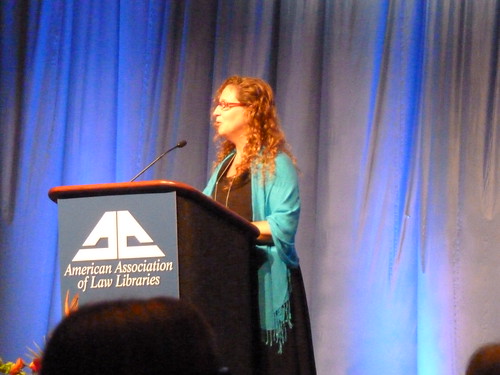
Dahlia Lithwick gave the keynote address Monday at the opening session. Apologies for the awful photograph -- there's a much better one on the front page of yesterday's Philadelphia Story. Lithwick spoke on free speech in the Supreme Court. She sees a schism in the court on the issue of free speech which has no relation to ideology. On this issue, Justices Scalia and Alito, who are in deep agreement elsewhere, are in deep disagreement. She ultimately traces this schism back to the Senate confirmation process, in which the justices, shy people not used to media attention at all, are subjected to a brutal confirmation in the media spotlight. Everyone knows it's a game except the justices, Lithwick says, and this then becomes their exposure to the media. Her talk was a great insight into what actually happens on the court. Lithwick feels that 90% of the work of the court is nuanced, thoughtful deliberation with great respect for the law. Lithwick feels that the court's fear of the media and the new technologies which serve to amplify that media actually works to ensure that what we hear about the court does not give a real sense of what actually happens on the court. If the court would embrace media, mainstream legal coverage would be less sensational and more informative.
Monday, July 25, 2011
Convention Center art
Convention centers often have art scattered around. Remember the huge gingko fruits in the Portland (Oregon) convention center? Philadelphia seems to have a particularly large and interesting collection, established when a city ordinance required that 1% of the building costs of the convention center be put aside to start the collection. So if, like me, you've been too busy to make it down to Museum Mile (I'm hoping to get there Tuesday afternoon), there are also things to see in the convention center itself.
One of the first pieces I noticed was China Wedge by Mei-Ling Hom, an enormous sculpture made of chinese restaurant bowls, cups and spoons framing an escalator.
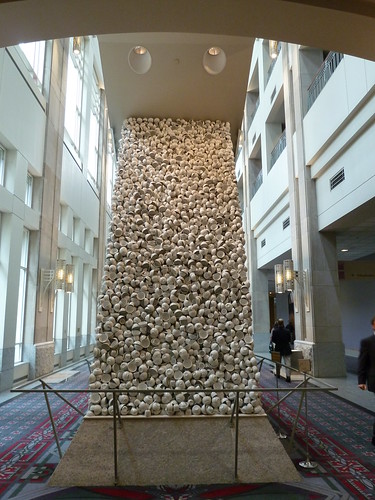
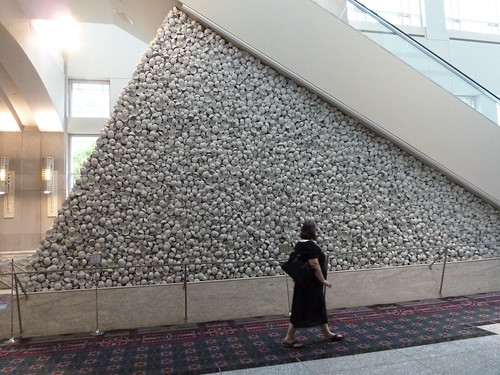
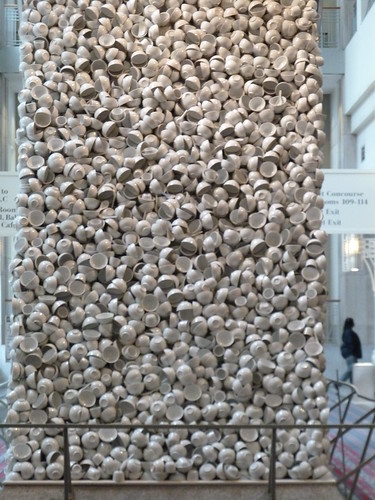
Two other sculptures
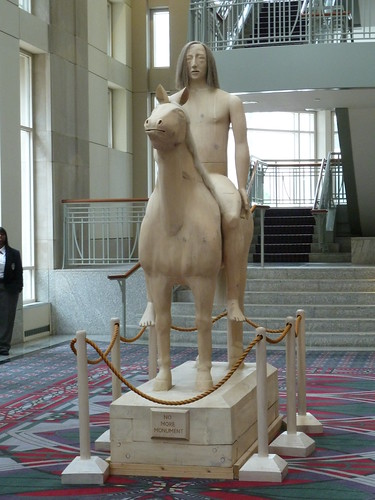
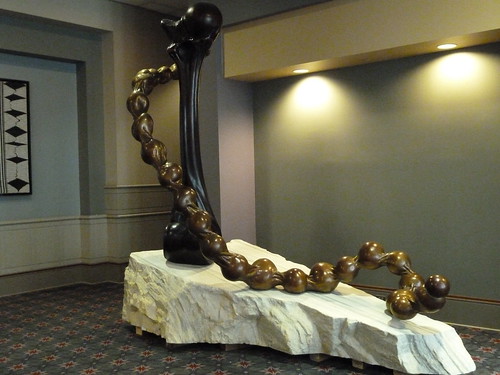
Transitions, Sidney Goodman
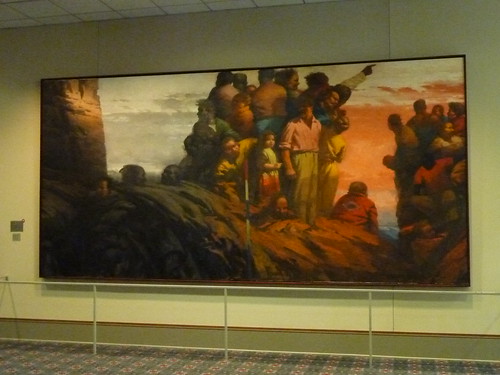
Two paintings by David Hopkins
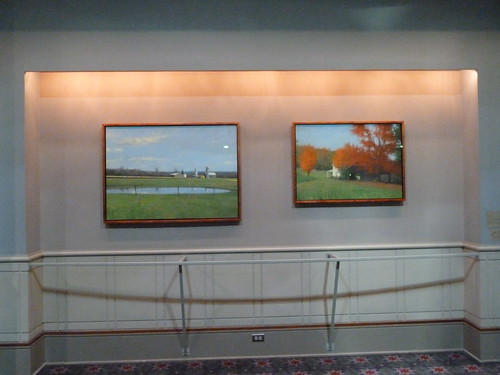
Joyce Mansfield
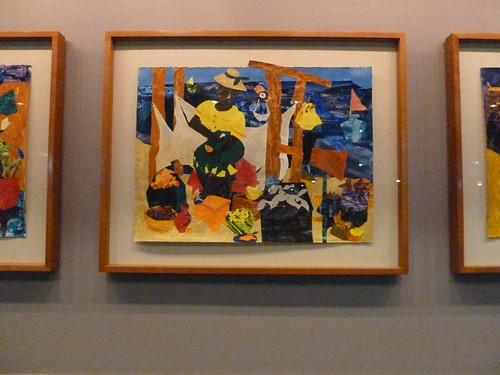
and three others . . .
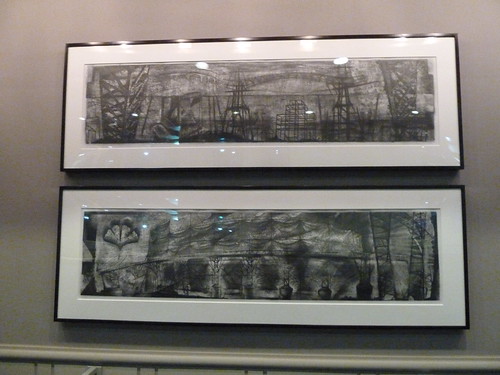
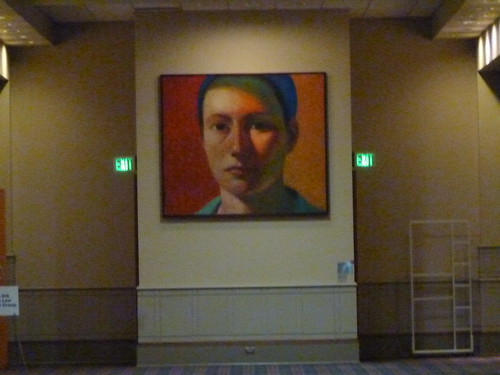
More about the Philadelphia Convention Center art collection here.
One of the first pieces I noticed was China Wedge by Mei-Ling Hom, an enormous sculpture made of chinese restaurant bowls, cups and spoons framing an escalator.



Two other sculptures


Transitions, Sidney Goodman

Two paintings by David Hopkins

Joyce Mansfield

and three others . . .


More about the Philadelphia Convention Center art collection here.
Sunday, July 24, 2011
Rene Chapman Award winner Yael Mandelstam

The 2011 Renee D. Chapman Memorial Award was presented to Yael Mandelstam, Head of Cataloging at Fordham University School of Law Library in New York, New York, at the Technical Services Special Interest Section business meeting on Sunday, July 24, 2011. Her contributions include:
- Serving as the AALL representative to the ALA Subject Analysis Committee;
- Founder and Chair, Genre/Form Terms for law material project;
- Member, Provider Neutral E-monograph Record Task Group;
- Founder and frequent presenter, Big Apple Catalogers' Klatsch.(B.A.C.K.);
- Member, AALL-Task Group on Vender-Supplied Bibliographic Records
Yael was joined at the presentation by her husband and her son.
In the exhibit hall
At the TS-SIS table, Aaron Kuperman demonstrates tricks to make ClassWeb more user friendly. Aaron will be available at the TS table on Monday, July 25, from 11:30 a.m.-2:15 p.m. and 3:15-5:00 p.m., and on Tuesday, July 26, from 11:30 a.m.-4:15 p.m.
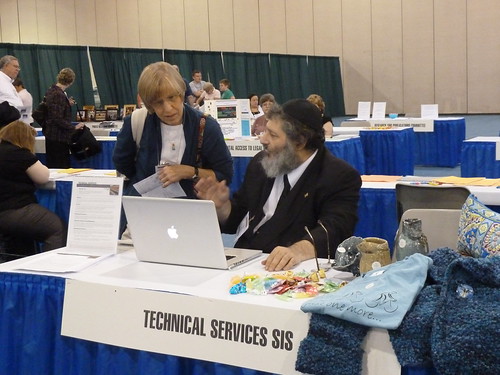
and items continue to pour in for the silent auction.
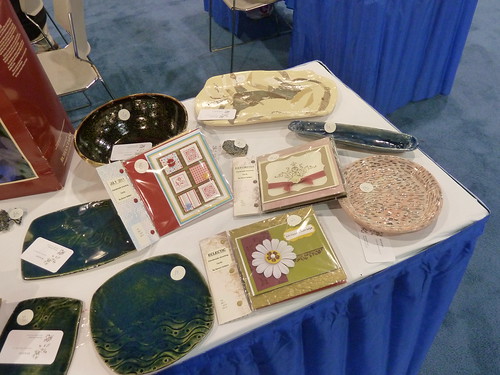
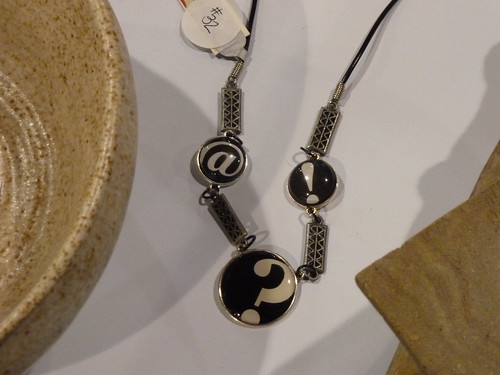
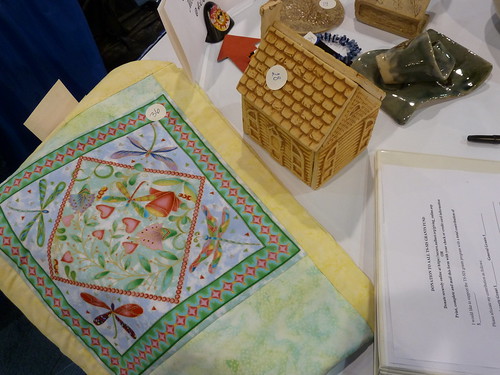
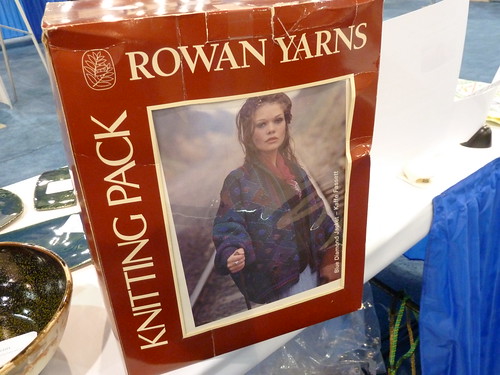

The used book exchange is underway at the OBS table, with the added bonus of tiny flashlights
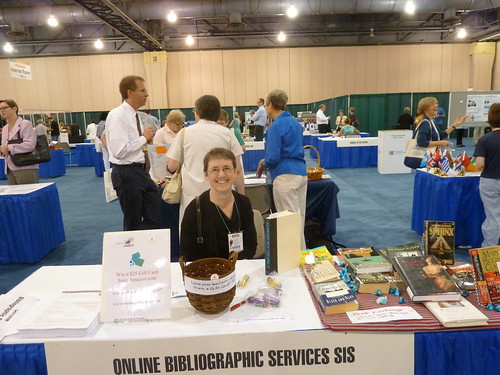
Hi Ellen!
And in the poster section, Susan Goldner explains her research into the holdings of statute law available in print at state, academic and private law libraries in MAALL
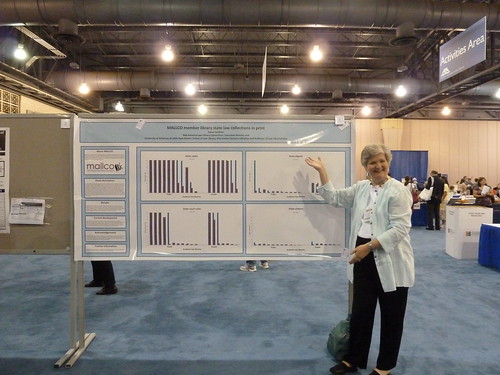
Don't miss the poster section, by the way, which is new this year. Two that stood out to me are posters by the University of Washington and the University of Chicago demonstrating two answers to the question of how to handle the less than scintillating task of shelf reading collections. Well worth checking out. And for next year, a poster is another opportunity to present if you have something specific, and maybe not quite big enough to be a program.

and items continue to pour in for the silent auction.





The used book exchange is underway at the OBS table, with the added bonus of tiny flashlights

Hi Ellen!
And in the poster section, Susan Goldner explains her research into the holdings of statute law available in print at state, academic and private law libraries in MAALL

Don't miss the poster section, by the way, which is new this year. Two that stood out to me are posters by the University of Washington and the University of Chicago demonstrating two answers to the question of how to handle the less than scintillating task of shelf reading collections. Well worth checking out. And for next year, a poster is another opportunity to present if you have something specific, and maybe not quite big enough to be a program.
Saturday, July 23, 2011
Silent Auction at 2011 TS-SIS Activities Table
This year TS-SIS is again sponsoring a silent action to promote and raise money for the Marla Schwartz Grants. These grants enable law librarians to attend conferences.
Below are some of the items available. Thanks to member-at-large Katrina Piechnik for organizing the auction!




Below are some of the items available. Thanks to member-at-large Katrina Piechnik for organizing the auction!




TS/OBS/RIPS/CS-SIS Joint Reception
Philly is hot!
I just arrived in Philadelphia this afternoon. The heat is intense, but luckily my hotel is right next to the convention center. I bumped into a number of friends on my way to registration. Chris Tarr said to get blogging, so here I am ... Looking forward to the exhibits opening and the alphabet soup reception tonight. Tomorrow I dive in with my first 7:00 AM meeting. (I have one every day!) We tech services types are dedicated, aren't we?
Welcome 2011!
It's Saturday. I'm in Philadelphia. From my limited exposure it seems that it's not as hot today as it was yesterday. And we're live!
Subscribe to:
Comments (Atom)



